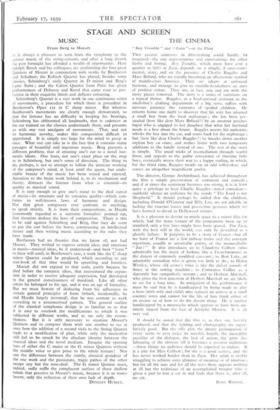Boy Trouble " and "Zaza "—at the Plaza Two greater
contrasts in film-making could hardly he imagined—the one unpretentious and entertaining, the other flashy and boring. Boy Trouble, which must have cost a quarter as little as Zaza, depends on a simple, if over-semi- mental, story, and on the presence of Charlie Ruggles and Mary Boland, who are rapidly becoming an affectionate symbol of middle-class America. They are adepts at unforced humour, and manage to give to muddle-headedness an aura of positive virtue. They are, in fact, you and me with the nasty pieces removed. The story is a series of variations on a typical theme. Ruggles, as a hard-pressed assistant in the small-boy's clothing department of a big store, suffers with nervous patience the tantrums of spoiled children. He returns home one night to discover that his wife has adopted a small boy from the local orphanage ; she has been per- suaded (how like dear Mary Boland!) by an amateur psycho- logist who is engaged to her daughter that what her husband needs is a boy about the house. Ruggles asserts his authority, whisks the boy into the car, and starts back for the orphanage ; but (how like dear Charlie Ruggles!) he knocks down another orphan boy en route, and rushes home with two temporary additions to the family instead of one. The rest of the story is simple. The usual tricks of reconciliation through scarlet fever, and appeals to the guilty conscience of thieving little boys, eventually weave their way to a happy ending, in which, for the third time, Ruggles treads on an odd roller-skate and comes an altogether magnificent purler.
The director, George Archimbaud, has achieved throughout the film a simple presentation of sentiment and comedy ; and if at times the sentiment becomes too strong, it is at least quite a privilege to hear Charlie Ruggles—noted comedian— suddenly silence an audience by the words "'the Lord is my Shepherd." It should perhaps be added that the children, including Donald O'Connor and Billy Lee, are rer.arkable in lacking the raucous voices and precocious gestures which we have learned to dread in Hollywood infants.
It is a pleasure to devote so much space to a minor film for which, had the main feature of the programme been up to standard, only a few lines might have been spared. For Zaza, with the best will in the world, can only be described as a ghastly failure. It purports to he a story of France—but all we have of France are a few railway trains and the constant repetition, usually at unsuitable points, of the monosyllable "Zut! " It also introduces us to Claudette Colbert (who admittedly has the merit of looking like a Frenchwoman) as the dancer of extremely modified can-cans ; to Bert Lahr, an admirable comedian who is given too little to do ; to Helen Westley, whose old crone's voice is like the dulcet sounds of Smee at the sewing machine ; to Constance Collier as a slatternly but sympathetic servant ; and to Herbert Marshall, who gives the best imitation of Herbert Marshall we are likely to see for a long time. In mitigation of his performance it must be said that he is handicapped by being made to play a hero (with wife and child) who seduces an actress at a small country town and cannot for the life of him think either of an excuse or of how to do the decent thing. He is further handicapped by a moustache which appears to have been un- timely ripped from the face of Adolphe Menjou. It is all very sad.
It should be noted that the film is, as they say, lavishly produced, and that the lighting and photography arc super- latively good. But the silly plot, the dreary prolongation of every scene to over twice its sensible length, the incredible puerility of the dialogue, the lack of action, the grim he- labouring of the obvious till it becomes a positive nightmare —these things no audience should he expected to endure. It it a pity for Miss Colbert ; for she is a good actress, and she has never worked harder than in Zaza. Her spirit is visibly struggling to achieve some glimmer of meaning or of emotion ; but for all the zuts and for all the tears there appears nothing at all but the technique of an accomplished trouper who is given a part to tear a cat in and finds that there is, after all, no cat.
BASIL WRIGI IT.










































 Previous page
Previous page